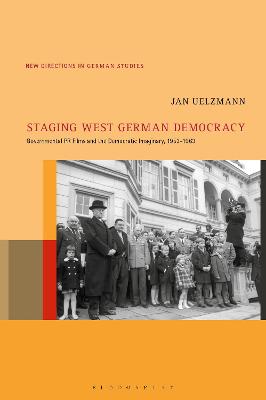New Directions in German Studies
1 total work
Staging West German Democracy examines how political “founding discourses” of the nascent Federal Republic (FRG) were reflected, reinforced, and actively manufactured by the Federal government in conjunction with the West German, state-controlled newsreel system, the Deutsche Wochenschau. By looking at the institutional history of the Deutsche Wochenschau and its close relationship to the Federal Press Office, Jan Uelzmann traces the Adenauer administration’s project of maintaining a “government channel” in an increasingly diverse, de-centralized, and democratic West German media landscape. Staging West German Democracy reconstructs the company’s integral role in the planning, production, and dissemination of pro-government PR, and through detailed analyses reveals the films to celebrate the FRG as an economically successful and internationally connected democracy under Adenauer’s leadership.
Apart from providing election propaganda for Adenauer’s CDU party, these films provided an important stabilizing factor for the FRG’s project of explaining and promoting democracy to its citizens, and of defining its public image against the backdrops of the Third Reich past and a competing, contemporary incarnation of German nationhood, the German Democratic Republic (GDR). In this regard, Staging West German Democracy adds in important ways to our understanding of the media’s role in the West German nation building process.
Apart from providing election propaganda for Adenauer’s CDU party, these films provided an important stabilizing factor for the FRG’s project of explaining and promoting democracy to its citizens, and of defining its public image against the backdrops of the Third Reich past and a competing, contemporary incarnation of German nationhood, the German Democratic Republic (GDR). In this regard, Staging West German Democracy adds in important ways to our understanding of the media’s role in the West German nation building process.
